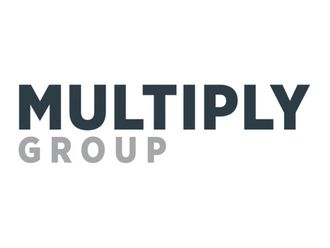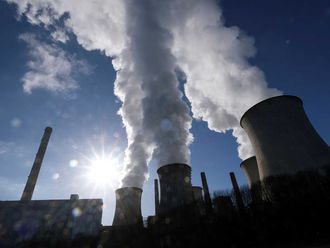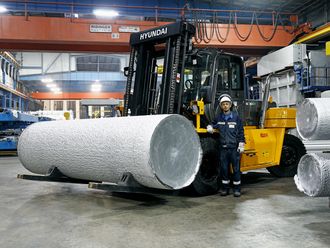Dubai: Stock markets in the United Arab Emirates may face more profit-taking on Monday, despite some positive first-quarter earnings, after oil prices slipped and Dubai failed to break through major technical resistance.
Brent crude dipped towards $66 a barrel on Monday as weak Chinese data added to demand fears, while near-record supplies from OPEC producers maintained worries about oversupply.
Dubai's index dropped 2.3 percent to 4,132 points on Sunday after initially inching above a strong chart barrier at its 200-day average, now at 4,244 points.
Having surged 20 percent last month, the benchmark may now pull back further and test strong technical support around 4,000 points, where it peaked repeatedly between December and February.
Profit-taking may temporarily dampen the performance of shares in Emaar Properties, although the company reported a better-than-expected 7 percent increase in first-quarter net profit late on Sunday.
According to Naeem brokerage, the profit boost was partly due to the adoption of a new accounting policy which allows firms to recognise revenue based on percentage of projects completed instead of their handover or sales on delivery.
But Naeem said the earnings were still positive and it maintained a "buy" recommendation on the stock with a target price of 14.61 dirhams, against Sunday's close of 7.94 dirhams.
Another earnings report came from Abu Dhabi Islamic Bank , which on Sunday posted a 10.1 percent rise in first-quarter net profit, broadly in line with estimates. Abu Dhabi's market has also been soft in the last few sessions as trading volumes in that emirate dropped.
Saudi Arabia's bourse is awaiting the publication later on Monday of final regulations allowing direct foreign investment in local stocks. Market players do not expect them to be very different from the draft version published last August.
The rules will most likely cap individual and combined foreign ownership of Saudi companies when the market opens to the first wave of qualified institutional investors on June 15.
The main Saudi index slipped 0.7 percent on Sunday after reports that the Riyadh-led coalition had deployed ground troops in Yemen. The coalition has since denied those reports and retracted a statement about very limited special forces involvement.
Saudi Arabia Fertilizers Co (SAFCO) may come under pressure on Monday after it said the start-up of a new urea plant owned by the company had been pushed back further to the end of June.
On global markets, Asian stocks have bounced from their lows and edged up on Monday after weak China factory activity reinforced views that Beijing will roll out fresh support measures soon for the world's second-largest economy.












